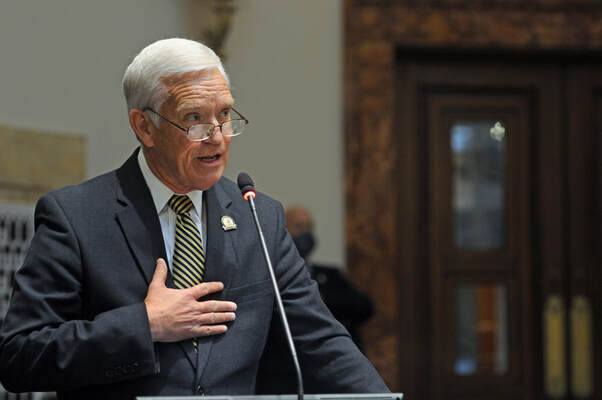|
by Senator Steve Meredith:
Another week of the 2021 Regular Session is in the books. With only have six legislative days left, robust discussion on critical issues is as prominent as ever. While crafting the state budget remains at the forefront of everyone’s minds, we are staying the course to uphold our other legislative obligations as members of the General Assembly by passing bills that include specific reforms and amendments to keep the Commonwealth moving forward. Activity from the Senate Chamber this week includes passage of another Senate priority bill, Senate Bill (SB) 5. Among numerous other measures, it is a bill that works to mitigate the negative impacts the COVID-19 pandemic has had on Kentucky’s economy and infrastructure. In this case, notably to support and provide reassurance to various sectors of our society trying to reopen or continue operation. If made law, SB 5 would provide liability protections for premises owners or leaseholders, including places of worship, schools, restaurants, medical facilities, and more. It would also establish essential services protections for food suppliers, manufacturers, distributors of personal protective equipment, child care service providers, and other businesses deemed essential. The measure, however, would not protect entities that act in a malicious or grossly negligent way to ignore safety orders during a state of emergency. As a sponsor of SB 5, I was pleased to see its passage this week. Senate Bill 122 is another bill I am sponsoring that passed this week. This measure would prohibit a state contract from being awarded to a business if it was already awarded the same or similar contract and if a contract was awarded through an executive agency lobbyist who was convicted of a crime related to contracts. It also prohibits a person associated with an agency from participating in a contract procurement for one year after termination. Other bills passing the Senate include: Senate Bill 53 allows a part-time adjunct instructor for the Kentucky Fire Commission to begin drawing benefits from the County Employees Retirement System without having to resign from that position, so long as the instructor has not previously participated in the Kentucky Employees Retirement System. Senate Bill 79 builds on the success of a bill that passed a couple of years ago that began automatically enrolling new state employees into Kentucky Deferred Compensation, but providing an opt-out option. SB 79 would do the same for legislators and judges. Deferred compensation serves as a savings account in which a certain portion of an employee's income is set aside to be paid later. Since the passage of the legislation related to state employees, 90 percent of new hires have remained in deferred comp, which stands to benefit them in the long run. Senate Bill 99 authorizes the construction of certain facilities without the supervision of a licensed architect or professional engineer, provided the work is performed consistent with the United States Department of Defense Building Code. Senate Bill 105 establishes guidelines for filing and serving a petition for the appointment of a person responsible for the possession, repair, and preservation of an abandoned and unsafe property. The bill also outlines the procedure for hearing a petition, defines the powers and duties of a conservator, and puts in place standards for the termination of a conservatorship. Senate Bill 128 provides any student enrolled in a Kentucky public school in grades K-12 during the 2020-21 school year the opportunity to request to participate in a temporary program during the 2021-22 school year to retake or supplement the courses or grades the student has already taken. The ultimate decision of providing this opportunity will be left to local school districts, which must decide to accept all student's requests or none at all. Quite simply, our students have missed their teachers, friends, and vital emotional and social experiences they deserve. SB 128 will provide local school districts with the ability to do right by students and families determining it is in their best interest to take advantage of a supplemental year of education. It will ensure participating seniors' preparedness for whatever their next chapter in life is, and all students the peace of mind knowing the pandemic will not cause them to be left behind. Senate Bill 146 establishes a requirement of a national and state criminal background check, via fingerprint analysis by the state police and the FBI, for every prospective and current employee of the Labor Cabinet or its agencies. Senate Bill 159 reorganizes the Kentucky Department of Military affairs by abolishing defunct offices and realigning others within the "Office of the Adjutant General." It also attaches the Kentucky Community Crisis Response Board to the Division of Emergency Management and alters its membership. Senate Bill 165 requires the link to a legal advertisement or notice website that the local government electronically publishes to be no more than 30 characters in length and in easy-to-understand terms. Senate Bill 172 requires persons who damage underground utility facilities, such as pipelines and telecommunications lines during demolition or excavation, to cease activity and notify the operator of the underground facility. Senate Bill 181 is a companion bill to House Bill (HB) 4, a bill that made final passage this week. HB 4 is a constitutional amendment bill, so it does not require the governor's signature. Instead, it will go before you, the voters, on the next general election ballot. If supported by a majority of voters, HB 4 would provide the General Assembly with the ability to call itself back into session. SB 181 would establish the Senate President's and House Speaker's power to reconvene the General Assembly for up to twelve additional legislative days via joint proclamation. Additionally, it would allow for any bills filed by the deadline of the close of a Regular Session to survive until December 31 of that same year. Senate Bill 212, also known as the "Kara Beth Adair Wilson Act," requires the various Kentucky retirement systems to develop an electronic method to which future changes to beneficiary designations for all members and new member forms, including beneficiary designation forms, must be submitted. Senate Bill 228 would reform how a U.S. Senator of Kentucky is replaced should a vacancy occur. The bill would establish that the departing senator's state party would nominate three people from which the governor would select. That individual would serve out the remainder of the term. Additionally, it sets stipulations about how long a replacement can serve before voters get to elect someone to take over that seat and establishes provisions about how such elections should be held. Senate Bill 255 relates to an emerging industry of commercial mining of cryptocurrency, as it provides incentives for this new and advanced technology in the Commonwealth by allowing a minimum investment of $1 million dollars to qualify for incentives. Bills headed to the governor's desk for consideration include: House Bill 7 establishes a Recovery Ready Community council and program for cities and counties that want to demonstrate their addiction recovery commitment. According to the Centers for Disease Control and Prevention, more than 83,000 people died in the twelve months ending in July 2020. The COVID-19 pandemic has only heightened addiction. The state has worked hard over the years to combat the scourge of drug addiction. Although the challenge is difficult, we must continue efforts to address the abuse of opioids and other narcotics. HB 7 is one more step in saving lives. House Bill 8 allows quasi-governmental organizations, such as local health departments and mental health centers, to pay back unfunded liabilities owed to the Kentucky Retirement Systems for Employees using a liability based system instead of a percent of payroll. By changing to a liability based contribution method, HB 8 provides assurance for accurate payment assumptions, allowing these agencies to adequately plan each fiscal year therefore reducing the risk of having to cut back on staff and services. HB 8 also establishes an intent that the general assembly will pay the increased cost associated with this bill for the first year. House Bill 50 provides that health insurance plans offered in Kentucky comply with a federal law designed to ensure the equal treatment of mental health conditions and substance use disorders by strengthening Kentucky’s implementation of the Mental Health Parity and Addiction Equity Act of 2008. That means health plans’ co-payments, deductibles, and limits on visits to health care providers are not more restrictive or less generous for mental health benefits than for medical and surgical benefits. An average of six people die of drug overdoses and suicides every day in Kentucky. It is vital that our state does not limit access or coverage to mental health care. House Bill 208 addresses the issue of getting our students back into schools amid the COVID-19 pandemic. Under this bill, local school districts MUST offer, at least, a hybrid schedule where all students are able to attend in-person classes a minimum of two days a week by March 29, 2021. Districts would still be able to offer virtual or remote learning for students whose Parents/Guardians provide written requests due to COVID-19 concerns. As a society, we have figured out a way to safely open restaurants, shopping malls, and movie theaters. It is time we finally do the same for Kentucky’s youth by prioritizing a pathway to normalcy for our schools. You can learn more about these bills and others by visiting www.legislature.ky.gov. Thank you for staying engaged in the legislative process. It is an honor to serve you in Frankfort. If you have any questions or comments about these issues or any other public policy issue, please call me toll-free at 1-800-372-7181 or email me [email protected].
0 Comments
Your comment will be posted after it is approved.
Leave a Reply. |
Archives
July 2024
|
|
Copyright 2014-2024 The Edmonson Voice.
The Edmonson Voice logos are registered trademarks. Call or text: 270-597-6550 [email protected] PO BOX 94 BROWNSVILLE, KY 42210 CLICK HERE FOR DEADLINE INFO |








